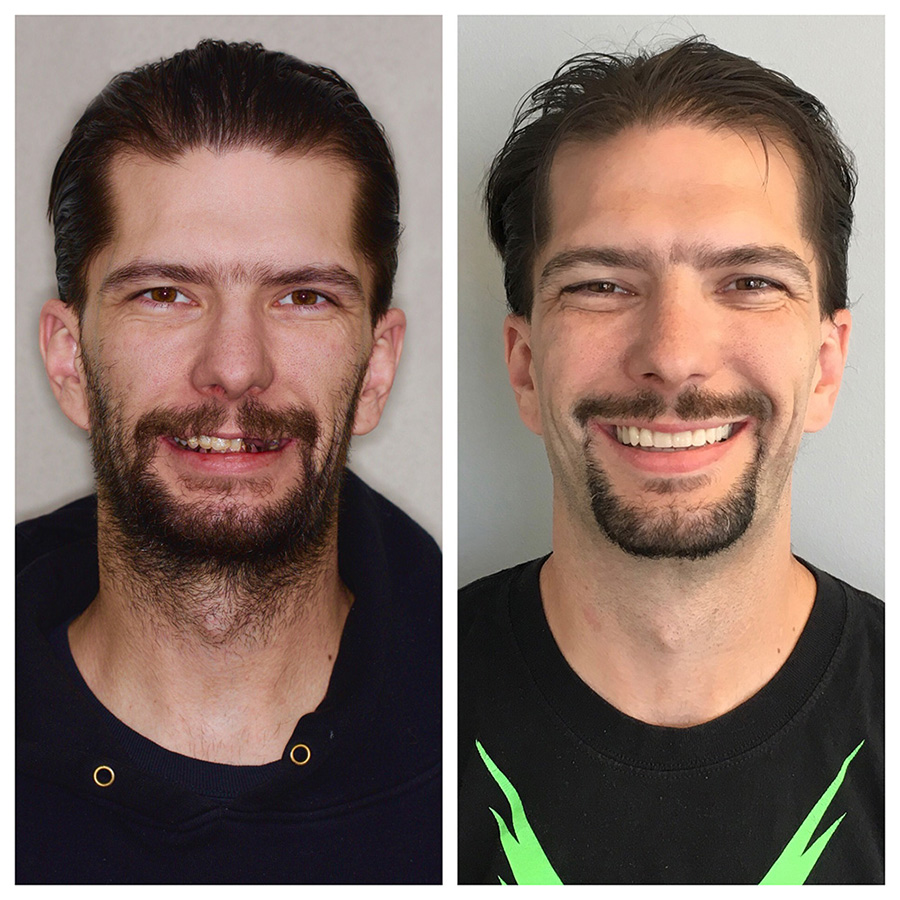
Joshua's Own Words...
Getting my teeth done at Portland Perio Implant Center has been one of the best life-changing decisions of my life. When I went to look at other locations the first part of the consultation was about financing. At the Portland Perio Implant Center the consultation started with getting to know me and really trying to understand my situation. We went over different options and ultimately decided that the “All on 4” would be the best option. Not once did I feel uncomfortable talking to them or showing them my smile. I was amazed when I was told that I could regain my smile in just one day. I now have a wonderful smile and I am much more social than before. I am able to eat foods that I thought I would never have again. Dr. Haghighat and his staff have kept in touch with me making sure that I am still doing well. I would absolutely recommend the Portland Perio Implant Center for anyone looking into dental implants.
The Treatment: All-On-4 Dental Implants
Joshua came to Portland Perio Implant Center in search of a suitable treatment solution for his terminal dentition. Many years of neglect had taken its toll and with a new and expanding family, he had made the decision to explore his options in regaining his oral health and function.
Unquestionably, the degree of destruction to his teeth was disfiguring and the lack of self-esteem and confidence were not surprising. Our assessment, which included a thorough social, clinical and radiographic examination, and cone beam CT scan imaging, revealed multifactorial condition and syndromes as the cause of his terminal dentition. The majority of the remaining dentition could not be restored due to excessive decay, fractures, and poor periodontal prognosis.
We explored the options for Joshua's oral rehabilitation to regain a healthy, functional, and esthetic outcome. We also considered his desires as well as financial limitations and opted for an All-on-4 dental implant solution for both arches.
In the past, Joshua had been given treatment options that included a period of edentulism and removable dentures. Facing the dilemma of uncomfortable dentures is understandably not an attractive one. Our All-On-4 treatment solution eliminates the need for removable dentures and it is not surprising that patients like Joshua find this concept attractive.
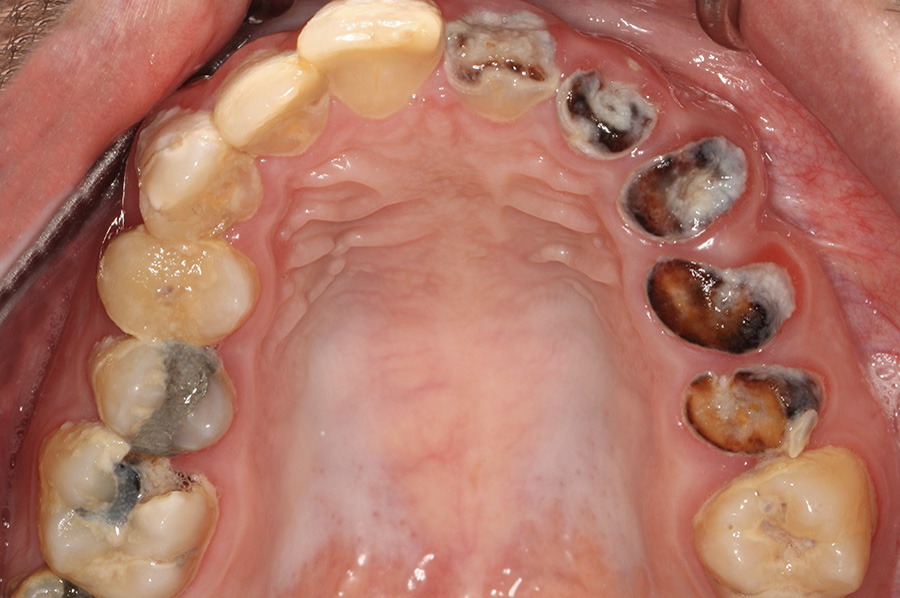
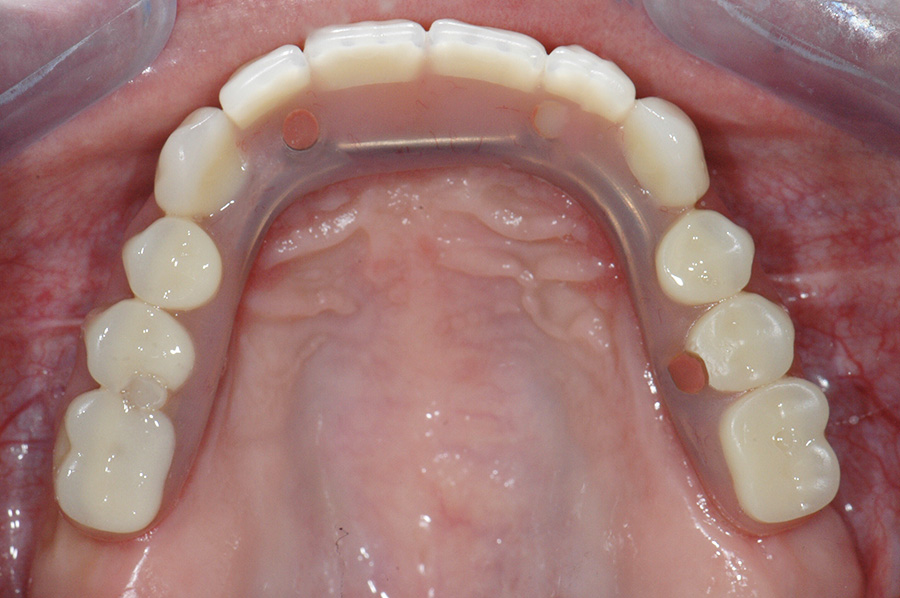
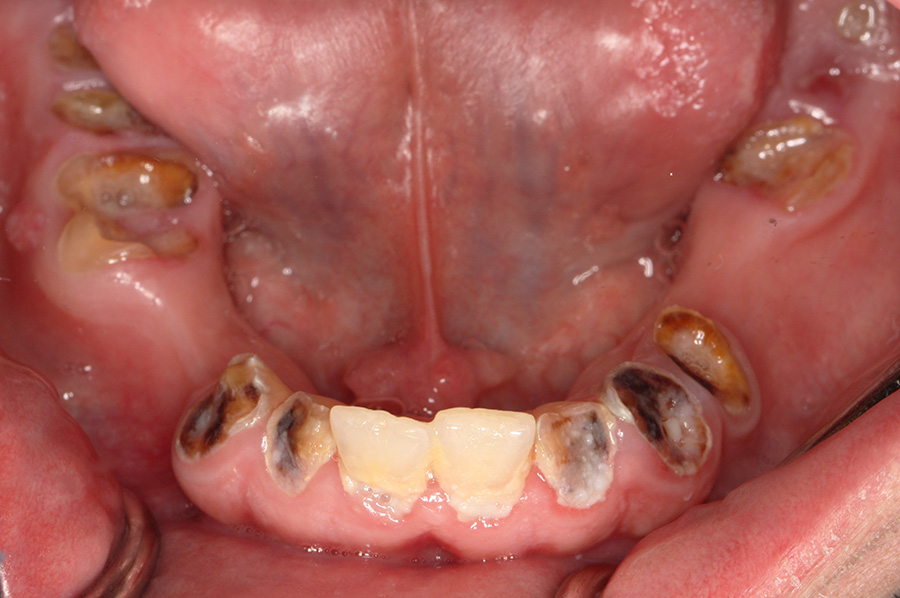
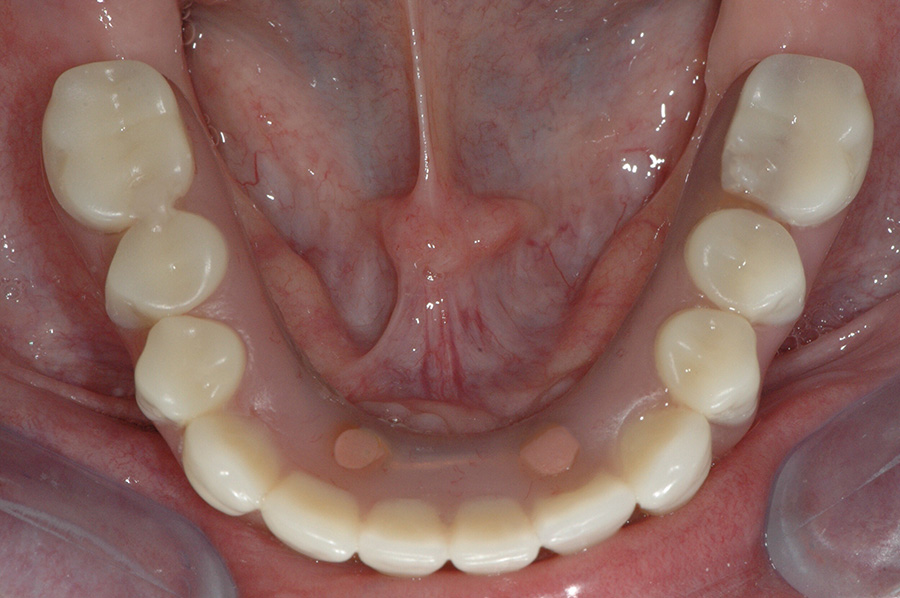
Following a thorough diagnostic workup, we were able to execute the treatment as pre-planned using state of the art implant planning computer software available in our office. Despite the complexity and extensive nature of teeth destruction, his first phase of treatment was completed in one day. This included the removal of all remaining teeth, placement of 4 dental implants in each arch, and provision of fixed (nonremovable) temporary upper and lower bridges. Typical treatment time for both arches is about six hours and the treatment is performed using sedation protocols for optimal comfort.
The immediate transformation for Joshua was incredible to witness. A new smile was created in one day with this revolutionary “teeth-in-a day” treatment concept. After a typical healing phase of about six months that allows for osseointegration of the dental implants, the fabrication of the final prosthesis can begin. All functional and esthetic changes can be made in this final step to create the desired outcome for each patient. In a collaborative effort between the surgical and prosthodontic specialties, and a motivated and compliant patient, Joshua has been given a smile he shows off proudly. His transformation has been truly remarkable and with his confidence and self-esteem, we’re delighted to see him excel in life with his family.
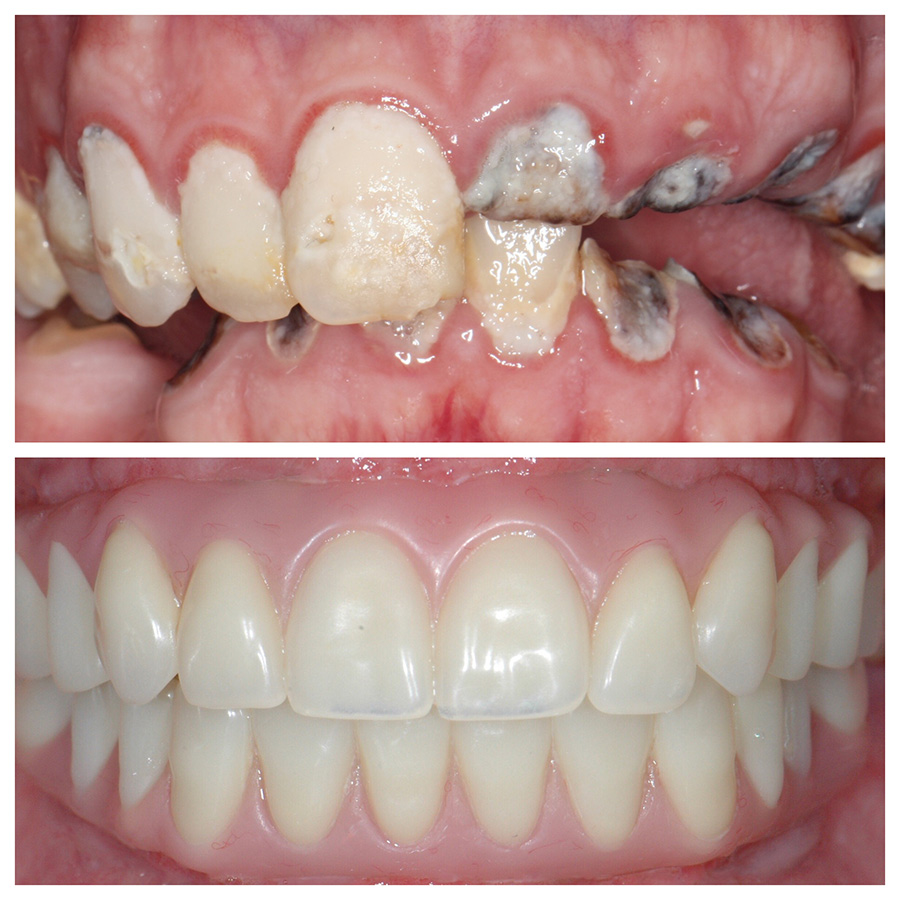
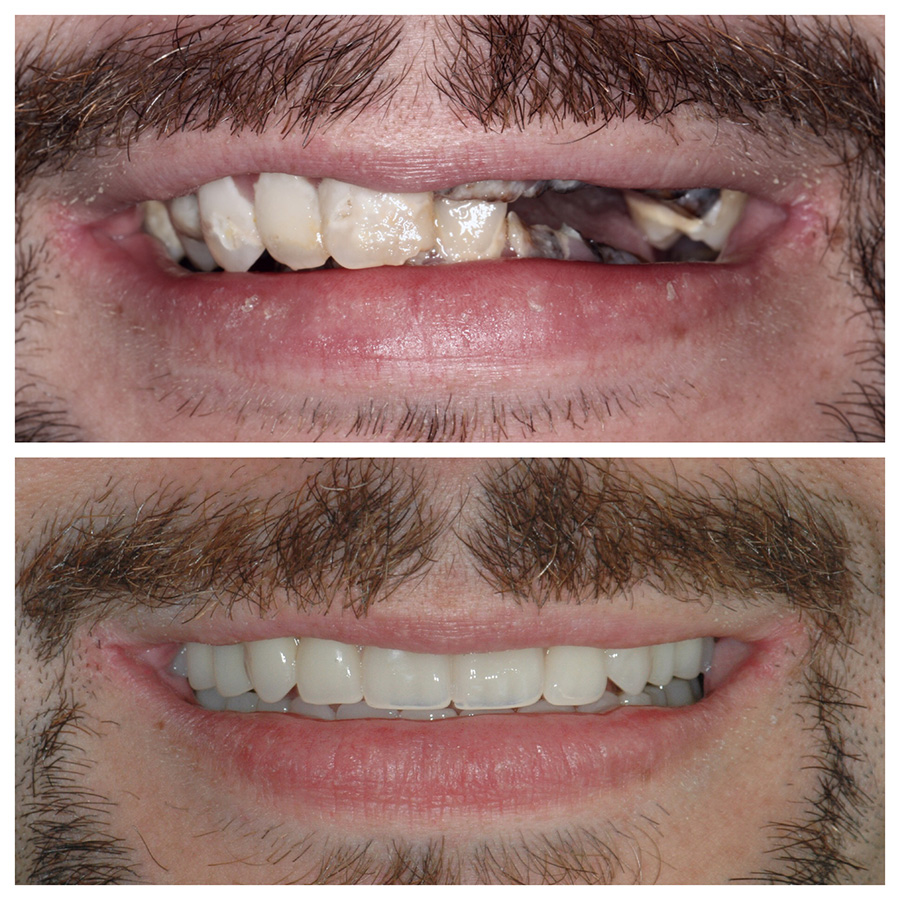
Do You Have A Terminal Dentition?
This is a term used to describe the status of one's dental condition where the manifested destruction and disease due to multifactorial causes has reached a point that renders teeth non-salvageable. The conditions and reasons that led to such advanced and devastating irreversible damage are not new, but the treatment remains a challenge. With the increase in the aging population, we are in turn faced with challenges in treatment that should either prevent the progression to a terminal dental state or provide more cost-effective and functionally superior options for teeth replacement than removable dentures. It is estimated that 20% of the aging population over 65 is edentulous and there is a higher demand for dental rehabilitation of this baby boomer population with dental implant therapy.
Causes of Terminal Dentition:
As mentioned, the causes of terminal dentition are more often multifactorial. Some of the most common conditions are described below. If not addressed correctly, the combination and additive destructive effects of two or more of these disease processes and conditions may produce a state of terminal dentition.
Dental Caries
Dental caries is a common bacterial cause of tooth destruction. The elderly population exhibit more gum recession and exposed root surfaces and thus are more susceptible to cervical root decay. As more of the aging population are relying on prescription medicines for health reasons, it is not uncommon to see drug-induced side effects. One side effect is the development of a dry mouth due to reduced salivary flow. Reduced salivary flow diminishes its buffering effects amongst many other functions and this may cause the development of rampant root caries more readily.
Periodontal Disease
Periodontal disease is a bacterial infection that causes destruction of the supporting structures of teeth (gums and bone). Despite the advancements in treatment protocols available and our knowledge of the various forms the disease may manifest, it remains the most common cause of tooth loss. It is estimated that 30-40% of the baby boomer population suffers a form of periodontal disease and over a third will lead to a state of edentulism.
Excessive Tooth Wear
Excessive tooth wear due to bruxism may reach a point that teeth become non-restorable. Bruxism is a condition in which you grind, gnash or clench your teeth. Many of us do it without even realizing. If you have bruxism, you may unconsciously clench your teeth when you're awake or clench or grind them during sleep.
Teeth grinding effects can range from mild to serious problems that may include: teeth mobility, fracturing of teeth, fracturing of dental prosthesis, including crowns and fillings, implant screw loosening and fractures, wearing of enamel, gum recession, aching in jaws and headaches, developing jaw joint disorders. An acidic environment caused by dietary practices or gastrointestinal reflux is a common cause of acid erosion of dental enamel. Presence of acid erosion accelerates the destructive effects of bruxism as well as cervical root caries.
Drug Abuse
While we consider drug abuse as a detriment to our general health, rarely do we consider the potential oral and dental ramifications of the rising drug epidemic. Although terminal dentition is often synonymous with an aging population, the drug-induced destruction of teeth is attributed to a much younger population. The challenges for oral rehabilitation of this group may, therefore, be even higher as treatment solutions will require a much longer period of use and function. Drug abuse can result in oral and dental health destructive in a variety of ways that include acid erosion, tendency to develop a grinding habit, oral hygiene neglect, development of xerostomia, development of rampant caries, dietary deficiencies that negatively implant oral structures as well as propensity to consume high sugar foods.
The psychological impacts of devastating dental destruction caused and longterm inability to eat, together with the loss of self-esteem due to the appearance of damaged teeth will remain a challenge in the road to recovery. Addressing the demanding oral rehabilitation needs of this group should, therefore, be a vital part of their recovery program.
